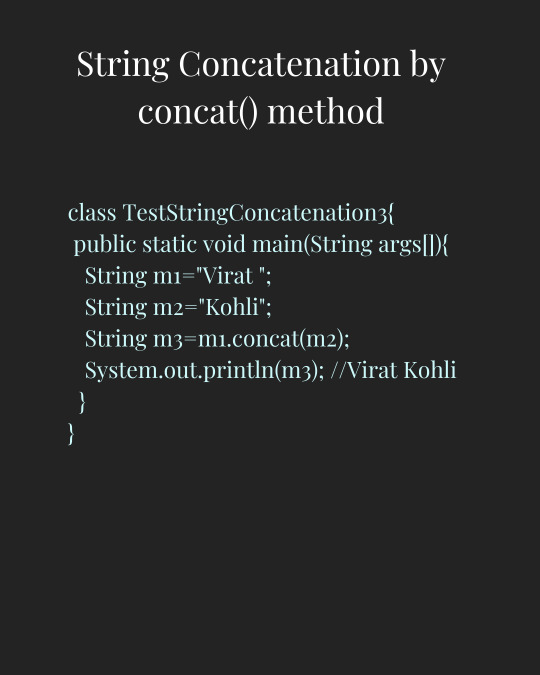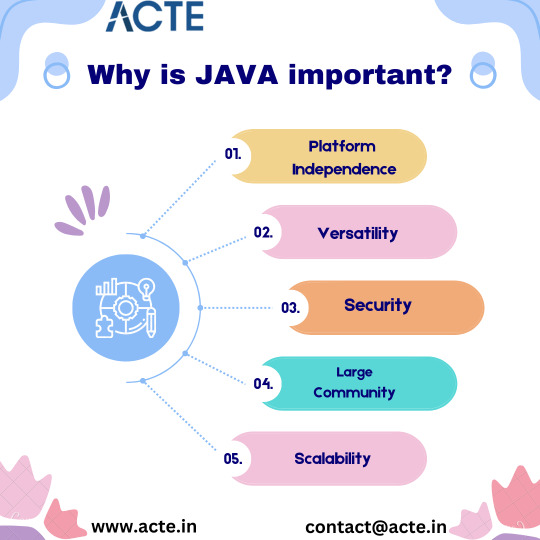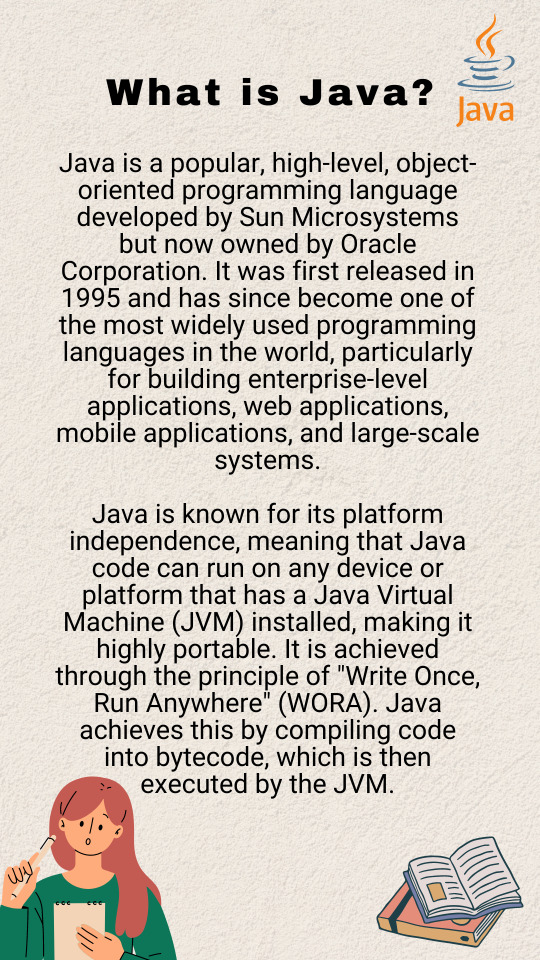#Java development training
Explore tagged Tumblr posts
Text
What are Java Variables and Why Are They Important in Programming?
When you first dive into Java, one of the main things you'll come across is variables. So, what are Java variables and why do they matter in programming? Simply put, they’re like containers that hold data for your program. They give you the flexibility you need to create cool applications. Grasping this idea is key to starting any Java course in Coimbatore.
The Basics of Java Variables
At the heart of it, Java variables are placeholders for data. Each variable has a specific type such as int, float, or String, which tells you what kind of data it can hold. Without them, managing data in your application would be tough. Knowing how to declare and use them is a must if you're looking at a Full Stack Developer Course in Coimbatore.
Types of Java Variables
Java has a few types of variables: local, instance, and static. Local variables exist only in methods, instance variables are tied to objects, and static variables belong to the class itself. Understanding these differences will help clarify what variables are and why they’re important in programming. You’ll go over this in detail during any professional Java training in Coimbatore.
Why Java Variables Matter
Java variables are important because they help developers write clean and logical code. They make it easier to reuse code and manage user input data effectively. This is why they are a key topic in any Java course in Coimbatore.
Declaring and Initializing Variables
To declare a variable in Java, you write the data type followed by the variable name, like so: `int age = 25;`. You can also set a value at a later point. This simple way of managing data shows why variables are important—they help you keep things organized, which is a vital skill you’ll learn in a Full Stack Developer Course in Coimbatore.
Scope and Lifetime of Variables
The scope of a Java variable refers to where it can be used in your code. For instance, a local variable is only available in the method where it's created. Getting a handle on variable scope will help you understand their importance in programming. You'll find this topic covered in detail during Java training sessions in Coimbatore.
Best Practices in Using Variables
Using clear variable names, keeping their scope small, and initializing them before use are some good habits that make programming easier. These practices show you what variables are and why they're important, and they’re stressed in every advanced Java course in Coimbatore.
Variables in Full Stack Development
In full stack Java development, variables are used in both the front-end and back-end parts of apps. They play a role in everything from handling UI inputs to managing databases. That’s why understanding what variables are and why they matter becomes even more relevant in a Full Stack Developer Course in Coimbatore where real-world projects are tackled.
Common Errors and Debugging Tips
Beginners often run into issues like forgetting to initialize variables or using the wrong data type. Spotting these mistakes is a big part of learning about variables. Regular debugging sessions and hands-on practice in Java training in Coimbatore can help you work through these challenges.
Conclusion: Build Your Java Skills with Xplore IT Corp
To really get a grip on what Java variables are and why they matter, practical experience is essential. Whether you’re starting out or aiming for a full stack role, a solid understanding of variables and similar concepts is crucial. Sign up for a Java Course, Java Training, or Java Full Stack Developer Course in Coimbatore with Xplore IT Corp to kickstart your Java programming journey.
FAQs
1. What are Java variables?
Java variables are storage spots for data that can change while the program runs.
2. Why are variables important in Java programming?
They help in handling data, keeping your code clean, and supporting dynamic data operations.
3. Are Java variables covered in a full stack course?
Yes, they're a key part of programming logic and are thoroughly covered in a Full Stack Developer Course.
4. Can I learn about Java variables online in Coimbatore?
Definitely! Most online Java training programs cover variables and data types.
5. Is mastering variables necessary before learning advanced Java?
Yes, they are a fundamental concept, and getting a handle on them is important before moving on to more advanced topics.
#Java data types#variable declaration in Java#Java variable scope#types of variables in Java#Java programming basics#object-oriented programming in Java#local variables in Java#instance variables in Java#static variables in Java#Java syntax#Java full stack developer skills#Java coding for beginners#Java development training#Java backend programming#Java learning institute in Coimbatore
0 notes
Text
What Is Quantum Particle Design?
In quantum mechanics, a particle's quantum state is a mathematical description that encapsulates all the information about its properties, such as position, momentum, and energy, and determines the probabilities of different measurement outcomes.

Mathematical Representation: Quantum states are often represented as vectors in a mathematical space called Hilbert space, or as wave functions.
Properties: These states describe the particle's characteristics, including position, momentum, energy, spin, and other measurable properties.
Quantum Superposition: A particle can exist in a combination of multiple quantum states simultaneously, a phenomenon known as superposition.
Measurement: When a measurement is made, the particle's quantum state "collapses" into a single, definite state, and the outcome of the measurement is determined by the probabilities associated with each possible state.
#quantum jumping#3d printing#academia#animation#quantum physics#time quangle#quantum mechanics#light particles#particle physics#subatomic particles#art#key to success#the mechanisms#artificial intelligence#archaeology#artists on tumblr#engineering#html#html css#javascript#javaprogramming#java training pune#developers#minecraft java
4 notes
·
View notes
Text
youtube
#online courses#coding#graphic designing#web design#ict skills#india#hindi#gujarati#english#www.ictskills.in#online training#live training#full stack course#digital marketing#ui ux design#backend#online#live courses#courses#education#computer science#engineering#java#python#php#dot net development company#spring mvc#javascript#Youtube
2 notes
·
View notes
Text
Which is better full stack development or testing?

Full Stack Development vs Software Testing: Which Career Path is Right for You?
In today’s rapidly evolving IT industry, choosing the right career path can be challenging. Two popular options are Full Stack Development and Software Testing. Both of these fields offer unique opportunities and cater to different skill sets, making it essential to assess which one aligns better with your interests, goals, and long-term career aspirations.
At FirstBit Solutions, we take pride in offering a premium quality of teaching, with expert-led courses designed to provide real-world skills. Our goal is to help you know, no matter which path you choose. Whether you’re interested in development or testing, our 100% unlimited placement call guarantee ensures ample job opportunities. In this answer, we’ll explore both career paths to help you make an informed decision.
Understanding Full Stack Development
What is Full Stack Development?
Full Stack Development involves working on both the front-end (client-side) and back-end (server-side) of web applications. Full stack developers handle everything from designing the user interface (UI) to managing databases and server logic. They are versatile professionals who can oversee a project from start to finish.
Key Skills Required for Full Stack Development
To become a full stack developer, you need a diverse set of skills, including:
Front-End Technologies: HTML, CSS, and JavaScript are the fundamental building blocks of web development. Additionally, proficiency in front-end frameworks like React, Angular, or Vue.js is crucial for creating dynamic and responsive web interfaces.
Back-End Technologies: Understanding back-end programming languages like Node.js, Python, Ruby, Java, or PHP is essential for server-side development. Additionally, knowledge of frameworks like Express.js, Django, or Spring can help streamline development processes.
Databases: Full stack developers must know how to work with both SQL (e.g., MySQL, PostgreSQL) and NoSQL (e.g., MongoDB) databases.
Version Control and Collaboration: Proficiency in tools like Git, GitHub, and agile methodologies is important for working in a collaborative environment.
Job Opportunities in Full Stack Development
Full stack developers are in high demand due to their versatility. Companies often prefer professionals who can handle both front-end and back-end tasks, making them valuable assets in any development team. Full stack developers can work in:
Web Development
Mobile App Development
Enterprise Solutions
Startup Ecosystems
The flexibility to work on multiple layers of development opens doors to various career opportunities. Moreover, the continuous rise of startups and digital transformation initiatives has further fueled the demand for full stack developers.
Benefits of Choosing Full Stack Development
High Demand: The need for full stack developers is constantly increasing across industries, making it a lucrative career choice.
Versatility: You can switch between front-end and back-end tasks, giving you a holistic understanding of how applications work.
Creativity: If you enjoy creating visually appealing interfaces while also solving complex back-end problems, full stack development allows you to engage both creative and logical thinking.
Salary: Full stack developers typically enjoy competitive salaries due to their wide skill set and ability to handle various tasks.
Understanding Software Testing
What is Software Testing?
Software Testing is the process of evaluating and verifying that a software product or application is free of defects, meets specified requirements, and functions as expected. Testers ensure the quality and reliability of software by conducting both manual and automated tests.
Key Skills Required for Software Testing
To succeed in software testing, you need to develop the following skills:
Manual Testing: Knowledge of testing techniques, understanding different testing types (unit, integration, system, UAT, etc.), and the ability to write test cases are fundamental for manual testing.
Automated Testing: Proficiency in tools like Selenium, JUnit, TestNG, or Cucumber is essential for automating repetitive test scenarios and improving efficiency.
Attention to Detail: Testers must have a keen eye for identifying potential issues, bugs, and vulnerabilities in software systems.
Scripting Knowledge: Basic programming skills in languages like Java, Python, or JavaScript are necessary to write and maintain test scripts for automated testing.
Job Opportunities in Software Testing
As the demand for high-quality software increases, so does the need for skilled software testers. Companies are investing heavily in testing to ensure that their products perform optimally in the competitive market. Software testers can work in:
Manual Testing
Automated Testing
Quality Assurance (QA) Engineering
Test Automation Development
With the rise of Agile and DevOps methodologies, the role of testers has become even more critical. Continuous integration and continuous delivery (CI/CD) pipelines rely on automated testing to deliver reliable software faster.
Benefits of Choosing Software Testing
Job Security: With software quality being paramount, skilled testers are in high demand, and the need for testing professionals will only continue to grow.
Quality Assurance: If you have a knack for perfection and enjoy ensuring that software works flawlessly, testing could be a satisfying career.
Automated Testing Growth: The shift toward automation opens up new opportunities for testers to specialize in test automation tools and frameworks, which are essential for faster releases.
Flexibility: Testing provides opportunities to work across different domains and industries, as almost every software product requires thorough testing.
Full Stack Development vs Software Testing: A Comparative Analysis
Let’s break down the major factors that could influence your decision:
Factors
Full Stack Development
Software Testing
Skills
Proficiency in front-end and back-end technologies, databases
Manual and automated testing, attention to detail, scripting
Creativity
High – involves creating and designing both UI and logic
Moderate – focuses on improving software through testing and validation
Job Roles
Web Developer, Full Stack Engineer, Mobile App Developer
QA Engineer, Test Automation Engineer, Software Tester
Career Growth
Opportunities to transition into senior roles like CTO or Solution Architect
Growth towards roles in automation and quality management
Salary
Competitive with wide-ranging opportunities
Competitive, with automation testers in higher demand
Demand
High demand due to increasing digitalization and web-based applications
Consistently high, especially in Agile/DevOps environments
Learning Curve
Steep – requires mastering multiple languages and technologies
Moderate – requires a focus on testing tools, techniques, and automation
Why Choose FirstBit Solutions for Full Stack Development or Software Testing?
At FirstBit Solutions, we provide comprehensive training in both full stack development and software testing. Our experienced faculty ensures that you gain hands-on experience and practical knowledge in the field of your choice. Our 100% unlimited placement call guarantee ensures that you have ample opportunities to land your dream job, no matter which course you pursue. Here’s why FirstBit is your ideal training partner:
Expert Trainers: Learn from industry veterans with years of experience in development and testing.
Real-World Projects: Work on real-world projects that simulate industry scenarios, providing you with the practical experience needed to excel.
Job Assistance: Our robust placement support ensures you have access to job openings with top companies.
Flexible Learning: Choose from online and offline batch options to fit your schedule.
Conclusion: Which Career Path is Right for You?
Ultimately, the choice between full stack development and software testing comes down to your personal interests, skills, and career aspirations. If you’re someone who enjoys building applications from the ground up, full stack development might be the perfect fit for you. On the other hand, if you take satisfaction in ensuring that software is of the highest quality, software testing could be your calling.
At FirstBit Solutions, we provide top-notch training in both fields, allowing you to pursue your passion and build a successful career in the IT industry. With our industry-aligned curriculum, expert guidance, and 100% placement call guarantee, your future is in good hands.
So, what are you waiting for? Choose the course that excites you and start your journey toward a rewarding career today!
#education#programming#tech#technology#training#python#full stack developer#software testing#itservices#java#.net#.net developers#datascience
2 notes
·
View notes
Text

String Concatenation by concat() method
In Java, you can concatenate strings using the concat() method. This operator allows you to join two or more strings together. Here's how you can use it:
#javalanguage#javaprogramming#programming#coding#code#trending#education#technology#tech#training#engineering#software#development#softwaredevelopment#besttraininginstitute#online#onlinetraining#traininginstitute#tutorial#java
3 notes
·
View notes
Text
Java Learning Roadmap: From Basics to Mastery
Embarking on a Java learning journey from the comfort of your home offers unparalleled flexibility and convenience. Whether your aspirations lie in web development, Android app creation, or backend coding, Java serves as a robust foundation.

This comprehensive guide outlines a step-by-step approach to help beginners effectively grasp Java concepts and skills from the comfort of their own space.
1. Establish Clear Learning Objectives: Prior to diving into Java learning, take a moment to define your goals. Determine what you aim to achieve with your Java proficiency, whether it's gaining foundational knowledge, tackling projects, or pursuing a career in software development.
2. Select High-Quality Learning Resources: Choose your learning materials wisely. Opt for reputable online platforms such as Udemy, Coursera, or Codecademy that offer well-structured Java courses tailored to beginners. Supplement your learning with books, video tutorials, and interactive exercises to enhance comprehension.
3. Start with Fundamental Concepts: Begin your Java journey by focusing on fundamental principles. Familiarize yourself with core concepts like variables, data types, loops, conditionals, and object-oriented programming basics. Online tutorials and interactive exercises serve as invaluable resources for grasping these foundational elements.
4. Cultivate Regular Practice Habits: Consistent practice is key to mastering Java. Allocate dedicated time each day to code, solve programming challenges, and engage in project work. Platforms like LeetCode, HackerRank, and CodeSignal provide a plethora of coding challenges to hone your skills and build confidence.
5. Engage in Project Development: Apply your newfound knowledge by embarking on real-world projects. Start with simple tasks, such as creating a calculator, a to-do list app, or a basic game. As you grow more confident, tackle more complex projects that align with your learning objectives and interests.

6. Connect with the Java Community: Join online forums, discussion groups, and social media communities to interact with fellow Java enthusiasts and experts. Platforms like Stack Overflow, Reddit, and GitHub offer invaluable opportunities to seek advice, share knowledge, and gain insights from experienced developers.
7. Embrace Constructive Feedback: Don't shy away from seeking feedback on your code and projects. Embrace constructive criticism as a catalyst for growth and improvement. Participate in code reviews, collaborate with peers, and leverage online resources to continuously refine your Java skills.
8. Stay Abreast of Developments: Java is a dynamic language with frequent updates and advancements. Stay informed about the latest trends, tools, and technologies in the Java ecosystem by following industry blogs, attending webinars, and exploring new frameworks and libraries.
9. Explore Advanced Topics: Once you've mastered the basics, delve into more advanced Java topics such as multithreading, networking, and database connectivity. Advanced Java courses, tutorials, and books offer deeper insights into these complex concepts, enabling you to expand your skill set further.
10. Build a Stellar Portfolio: As your Java proficiency grows, assemble a portfolio to showcase your projects and achievements. A well-curated portfolio serves as a compelling demonstration of your skills and capabilities to potential employers or clients. Highlight your standout projects, provide detailed descriptions, and showcase your problem-solving prowess to make a lasting impression.
Conclusion: Learning Java from home is an enriching journey that empowers individuals to unlock countless opportunities in software development. By setting clear goals, leveraging quality resources, practicing consistently, and engaging with the Java community, you can confidently master this versatile programming language and chart a successful career path in technology. Remember, dedication, perseverance, and a genuine passion for learning are the driving forces behind your Java learning journey's success.
#technology#java#javaprogramming#javascript#computerscience#programming#developer#java course#java training#java training course
2 notes
·
View notes
Text
The Future of Full Stack Java Development

Full-stack developers, also known as “jack of all trades,” are in high demand in India. They are capable of carrying out the duties of numerous professionals. They earn good money and have many job opportunities with rewarding experiences because of their diverse skills. Full-stack Java programming has a bright future because its popularity is growing and will continue to grow in the coming years.
It’s well known that full-stack developers are proficient in both server-side and client-side programming. They are the professionals who carry out the responsibilities of backend and frontend developers. Despite not always being regarded as specialists, their abilities enable them to handle development tasks with ease. All firms look forward to having a brilliant full-stack developer as a future developer for a number of reasons. They handle a variety of technologies, which enables them to manage more project facets than the typical coder.
An experienced web developer who primarily works with Java programming is known as a Java full-stack developer. The front end, back end, and database layer are the three levels of code that these web developers build. The web development teams are frequently led by full-stack Java engineers, who also assist in updating and designing new websites. Because there is a great demand for Java full-stack developers. Many institutions have seized the opportunity by providing well-thought-out Java full-stack developer courses. You may study full-stack development quickly and become an expert in the area with the aid of these courses.
Java Full Stack Development by Datavalley
100% Placement Assistance
Duration: 3 Months (500+ hours)
Mode: Online/Offline
Let’s look into the future opportunities for full-stack Java professionals in India.
4 things that will Expand the Future Purpose of Java Full-Stack Developers
The Role of a Full-Stack Developer
Full-stack developers work on numerous tasks at once. They need to be extremely talented and knowledgeable in both front-end and back-end programming languages for this. JavaScript, CSS, HTML, and other frontend programming languages are essential. When creating new websites or modifying old ones, Java is a key programming language used by Java full-stack developers. However, backend programming languages consist of .Net, PHP, and Python depending on the projects. The full stack developers are distinguished from other developers by their proficiency and understanding of programming languages. With the availability of the finest Java full stack developer training, students may now easily master a frontend programming language like Java. The full-stack developer is more valuable and in demand when they are knowledgeable in multiple programming languages.
Responsibilities of a Full-Stack Developer
Functional databases are developed by full-stack developers. It creates aesthetically pleasing frontend designs that improve user experience and support the backend. The entire web-to-web architecture is under the control of these full-stack developers. They are also in charge of consistently maintaining and updating the software as needed. The full-stack developers bear the responsibility of overseeing a software project from its inception to its finalized product.
In the end, these full-stack developers also satisfy client and technical needs. Therefore, having a single, adaptable person do many tasks puts them in high demand and increases their potential for success in the technology field. Through extensively developed modules that expand their future scope, the Java full-stack developer course equips students with the skills necessary to take on these tasks.
The full-stack developer salary range
Full-stack developers are among the highest-paid workers in the software industry. In India, the average salary for a full-stack developer is 9.5 lakhs per annum. The elements that determine income typically include experience, location of the position, company strength, and other considerations. A highly skilled and adaptable full-stack developer makes between 16 and 20 lakhs per annum. Full-stack engineers get paid a lot because of their extensive skills, they can handle the tasks of two or three other developers at once.
By fostering the growth of small teams, preventing misunderstandings, and cutting the brand’s operating expenses, these full-stack developers perform remarkable work. Students who take the Java full-stack developer course are better equipped to become versatile full-stack developers, which will increase their demand currently as well as in the future in the industry.
Job Opportunities of Java Full Stack Developers
The full-stack developers are knowledgeable professionals with a wide range of technological skills. These competent workers are conversant with numerous stacks, including MEAN and LAMP, and are capable of handling more tasks than a typical developer. They are skilled experts with a wealth of opportunities due to their extensive understanding of several programming languages.
Full-stack developers are in high demand because they can work on a variety of projects and meet the needs of many companies. The full-stack Java developer course helps students build this adaptability so they can eventually become the first choice for brands searching for high-end developers.
As a result, these are a few key factors improving the future prospects of Java Full Stack developers in India. They are vibrant professionals who are in high demand due to their diverse skill set and experience, and they are growing steadily. The Java full stack developer course can help students hone their knowledge and abilities to succeed in this industry.
Datavalley’s Full Stack Java Developer course can help you start a promising career in full stack development. Enroll today to gain the expertise and knowledge you need to succeed.
Attend Free Bootcamps
Looking to supercharge your Java skills and become a full-stack Java developer? Look no further than Datavalley’s Java Full Stack Developer bootcamp. This is your chance to take your career to the next level by enhancing your expertise.
Key points about Bootcamps:
It is completely free, and there is no obligation to complete the entire course.
20 hours total, two hours daily for two weeks.
Gain hands-on experience with tools and projects.
Explore and decide if the field or career is right for you.
Complete a mini-project.
Earn a certificate to show on your profile.
No commitment is required after bootcamp.
Take another bootcamp if you are unsure about your track.

#dataexperts#datavalley#data engineering#data analytics#dataexcellence#business intelligence#data science#power bi#data analytics course#data science course#java developers#java full stack bootcamp#java full stack training#java full stack course#java full stack developer
2 notes
·
View notes
Text
Unleashing the Power of Java: Your Guide to a Versatile Programming Language
Java: The Language of Digital Choreography
Programming languages are like the words we use to communicate with computers, and among these languages, Java stands out as a versatile and powerful tool. Imagine it as teaching your computer to dance to your tune, where your instructions are written in Java. But what makes Java so special, and why is it so widely embraced in the world of programming? Let's dive into the key reasons behind its importance.

1. Platform Independence: Java's Superpower
Java possesses a superpower—it can run on various computer systems without requiring modifications. How? Java programs are transformed into bytecode, a universal language understood by the Java Virtual Machine (JVM). This bytecode runs seamlessly on Windows, Mac, or Linux, making Java truly platform-independent.
2. Versatility: The Swiss Army Knife of Programming
Java is like a Swiss Army knife for programmers. It's not limited to one domain; you can use it to craft web applications, mobile apps, desktop software, and even embed it in small devices like smart thermostats. Its adaptability knows no bounds.
3. Security: A Robust Guardian
In an age where digital security is paramount, Java takes security seriously. It boasts built-in features that safeguard your computer and data from malicious software, providing peace of mind in our increasingly interconnected world.
4. Large Community: Your Support Network
The vast Java community is a valuable resource. With a multitude of Java developers out there, you can easily find help, access resources, and leverage libraries. If you encounter a coding challenge, chances are someone else has faced it and shared a solution.
5. Scalability: From Small to Massive
Java scales effortlessly. It's trusted by major corporations to power their colossal systems. Whether you're creating a small game or launching a massive e-commerce platform, Java can handle the challenge.

The Java Odyssey: Transforming Code into Digital Life
Understanding the inner workings of Java is paramount in the realm of programming. It unfolds as an intricate journey, a symphony of steps that bring your code to life, transforming instructions into digital ballet. Let’s delve deeper into this process:
1. Composition of Code: The Birth of Instructions
The journey commences with the composer, the programmer, crafting Java code that resonates with human understanding. It’s akin to writing the script for a grand performance, where every line of code becomes a note in the symphony of instructions.
2. Compilation: The Translator’s Artistry
Your code embarks on a transformative voyage known as compilation. This step resembles a skilled translator rendering a literary masterpiece into a universal language. The code metamorphoses into bytecode, a linguistic bridge that computers understand.
3. Bytecode: The Choreographer’s Notation
Bytecode emerges as the choreographer’s notation — a graceful set of instructions, akin to dance moves meticulously notated on a score. The Java Virtual Machine (JVM) is the dance floor, and bytecode is the choreographic masterpiece. It is platform-agnostic, a language that speaks fluently on any stage where a JVM is present.
4. Execution: The Grand Performance
The Java Virtual Machine takes center stage, assuming the role of the conductor and principal dancer. It orchestrates the grand performance by executing the bytecode on the target computer. This is where your program comes to life, faithfully translating your meticulously crafted instructions into tangible actions.
The Call to Adventure: Java Awaits
Now, are you ready to embark on the captivating adventure of Java? It beckons with the promise of exploring boundless possibilities and orchestrating digital feats. Java’s prowess extends across a myriad of applications, underpinned by its platform independence, fortified security, and the unwavering support of a vibrant community. If you harbor the eagerness to communicate with computers and guide them to perform incredible acts, Java stands as the perfect threshold.
Java is your gateway to a world where code transforms into enchanting performances, where the mundane becomes extraordinary. It is here that your journey unfolds, a journey of endless creativity and digital choreography that awaits your creative touch. Step onto the Java stage, and let your programming odyssey commence.
For those looking to deepen their understanding of Java, we strongly recommend exploring ACTE Technologies. Their qualified instructors can significantly enhance your learning journey, offering certificates and career placement opportunities. Whether you prefer online or offline access, ACTE Technologies provides a wealth of resources to help you master Java. Consider enrolling in one of their courses to embark on a step-by-step learning adventure.
#javacourse#javascript#javadevelopmentcompany#javaprogramming#javaprojects#best java developer jobs#best java training
4 notes
·
View notes
Text
CETPA Summer Training: Gain the Skills You Need to Excel in Your Career
CETPA's Summer Training program is designed to help you gain the skills you need to excel in your career. Whether you're an engineering student, a business student, or a recent graduate, CETPA's program can help you develop the skills you need to land your dream job.
Summer Training in Noida at CETPA covers a wide range of topics, including:
JAVA
Python
Machine Learning
Data Science
Data Analytics
Web Development
much more.
We also offer a variety of hands-on projects and case studies, so you can put your skills to the test and gain real-world experience.
In addition to the technical skills, our program also helps you develop soft skills, such as communication, teamwork, and problem-solving. These skills are essential for success in any career.
CETPA's Summer Training in Noida is taught by experienced industry professionals who are passionate about teaching. They will help you master the skills you need to succeed in your career.
If you're looking for a Summer Training in Noida that will help you gain the skills you need to excel in your career, CETPA Infotech is the perfect choice for you.
Benefits of attending CETPA's Summer Training :
Gain the skills you need to excel in your career
Get ahead of the competition
Network with industry professionals
Learn from experienced industry professionals
Gain real-world experience
Develop soft skills
For more information:
Visit:https://www.cetpainfotech.com/summer-training
Contact:+91-9212172602

#summer training#summer training in noida#summer training in delhi#online summer training#techskills#itcareer#java training#python training#machine learning#web development#data science#data analytics#dot net
2 notes
·
View notes
Text
Strong Tech Foundations: Where Data Intersects Development
With today's competitive job market, understanding both data and coding is no longer an added advantage—it's essential. That's why two fields have become the building blocks for tech candidates: structured data analysis and hands-on programming experience.
A data analysis course for beginners offers an entry point to the booming world of data-informed decision-making. These courses focus on learning the basics—like Excel, Python, and SQL—while giving the student an overview of how to sanitize, graph, and extract insights from raw data. For non-tech students, it's an ideal introduction, creating confidence and excitement for additional training in more advanced analytics and AI streams.
On the other hand, hands-on coding experience is equally important—especially for software development roles. A Java internship for freshers provides early-career developers an opportunity to put what they've learned in the classroom to use on actual software problems. Java, one of the most popular backend programming languages even today, finds a huge array of applications in enterprise-scale applications, banking systems, and web platforms that scale up. Through an internship, beginners pick up object-oriented programming, backend integration, and even version control tools in team environments.
Together, these two experiences provide a solid basis for a diversified tech career. Whether one wishes to capitalize on data into decisions or develop solid software solutions, starting with the proper combination of skills positions you for long-term success within the sector.
#embedded systems course in Kerala#full stack java developer training in Kerala#python full stack developer course in Kerala#data analysis course for beginners#data analytics courses in kerala#full stack java developer course with placement#software developer internship in Kerala#java internship for freshers#full stack web development internship#software training institutes in kochi#best software training institute in kerala#best software training institute in trivandrum#software training institutes in kannur#best software training institute in calicut#data science course in kerala#data science and ai certification course#certification in ai and ml
0 notes
Text

Become a job-ready developer with Chanakya Digital Academy’s Full Stack Java Development Course. This industry-focused program trains you in both front-end and back-end technologies including HTML, CSS, JavaScript, React, Core Java, Spring Boot, Hibernate, and MySQL. Learn to build full-fledged web applications from scratch with hands-on projects and expert guidance. Whether you're a student, graduate, or working professional, this course equips you with the skills in demand by top tech companies. With practical training, real-time assignments, and placement assistance, you’ll be fully prepared for a successful career in software development. Start your full stack journey with us today!
Check out : https://chanakyadigitalacademy.com/full-stack-java-development-course-in-mysore/ https://chanakyadigitalacademy.com/
Contact Details No.904, First Floor, New Kantharaj Urs Rd, near Apollo Hospital, Kuvempu Nagara, Mysuru, Karnataka 570023 [email protected] +91 95388 58589
0 notes
Text
Understanding Object-Oriented Programming with Java
Java is one of the most powerful and reliable programming languages in the world of technology. Its popularity comes not just from its cross-platform capabilities but also from its strong support for Object-Oriented Programming (OOP). For those who want to build a strong foundation in programming, learning OOP with Java is a great first step. Many students choose the Best Java Training Institute in Hyderabad, Kukatpally, KPHB to master Java through expert guidance and real-time project experience.
🧠 What is Object-Oriented Programming?
A programming model called object-oriented programming (OOP) organizes software design around data rather than logic and functions. Each object can contain data — in the form of fields — and code — in the form of methods. OOP allows developers to create modules that can be reused across different programs, which improves productivity and reduces errors.
🔑 Core Principles of OOP in Java
Java is a fully object-oriented language that uses the following four pillars to structure and build software:
✅ Encapsulation: Protecting Data
Additionally, it restricts access to some components, enhancing control and securityo
🧬 Inheritance: Reusing Code
Inheritance enables new classes to inherit features from existing ones. In this way, you can reuse code and develop hierarchical class structures to keep your code clean and easy to maintain.
🔁 Polymorphism: Flexibility in Code
Polymorphism allows objects to take on multiple forms. For instance, the same method name can behave differently based on the object that is invoking it. This adds flexibility and dynamism to your code.
🎭 Abstraction: Simplifying Complexity
Abstraction hides internal details and shows only the most essential features of an object in order to reduce complexity. This makes the code easier to work with and less error-prone.
💡 Why Learn OOP with Java?
It is easy to learn OOP with Java since it was designed with these principles in mind.The API is rich and the community support is strong, and its syntax is user-friendly and beginner-friendly. Whether you’re building web apps, Android apps, or enterprise software, Java's OOP approach gives you the tools to build scalable and robust solutions.
🎓 The Long-Term Benefits of Learning OOP
Mastering OOP early in your programming career helps you write cleaner, more maintainable code. It also sets the stage for learning other advanced technologies like Spring Boot, Hibernate, and Android development, all of which are based on Java and OOP principles.
Conclusion: Start Your Java Career with Confidence
Understanding object-oriented programming is essential for anyone aiming to become a professional software developer. If you're looking for expert-led, practical training in Java, Monopoly IT Solutions is here to guide you. With real-time projects, experienced trainers, and industry-relevant content, we’ll help you build a strong foundation in Java and prepare you for a successful tech career.
#java full stack training#java full stack training in hyderabad#java full stack training in kphb#java full stack developer training
0 notes
Text
UI/UX Design Mastery Course in Madurai – Elevate Your Design Skills
The UI/UX Design Mastery Course in Madurai is an ideal program for aspiring designers and tech enthusiasts eager to break into the world of user interface and user experience design. Tailored for beginners as well as professionals looking to enhance their skills, this course offers a perfect blend of theoretical knowledge and hands-on experience.
Participants will learn the fundamentals of design thinking, user research, wireframing, prototyping, and usability testing. The curriculum also covers industry-leading tools like Figma, Adobe XD, and Sketch, ensuring learners gain practical expertise. The course emphasizes real-world projects and case studies to help students build an impressive design portfolio.
Guided by experienced mentors and industry experts, students receive personalized feedback and career guidance throughout the program. Whether you aim to work with top tech companies, start your freelance design journey, or build your own product, this course equips you with the skills to deliver intuitive and engaging digital experiences.
Located in Madurai, this program offers in-person and hybrid learning options, making it accessible and flexible for learners from different backgrounds. With a focus on creativity, innovation, and user-centric design, the UI/UX Design Mastery Course is your gateway to a rewarding career in the dynamic field of digital design.
Enroll today to unlock the power of design and transform your ideas into user-friendly interfaces that make a lasting impact.
#Software Courses: Software Courses#Animation Courses#IT Training#Data science and Data Analytics#Full stack development#Software Testing#C#C++#Java#Dotnet#Python#Networking and Cloud#Web development. Animation Courses: Graphic Designing#UI UX Design#2D & 3D Animation#Game Designing#Visual Effects#Digital Marketing.
0 notes
Text
Selenium vs Cypress vs Playwright: Best Tool for 2025?

As software delivery speeds accelerate, QA professionals need the right test automation tools to keep pace. In 2025, three names dominate the conversation: Selenium, Cypress, and Playwright. Each framework brings unique strengths in automation testing, cross-browser testing, and CI/CD integration. But which one should you master this year? Let’s dive in.
Why Automation Testing Matters in 2025?
With the rise of DevOps and continuousintegration, manual testing alone can no longer ensure fast, reliable releases. Testautomation empowers teams to catch regressions early, maintain high code quality, and accelerate deployment cycles. By 2025, organizations expect QA engineers to:
Integrate tests seamlessly into CI/CD pipelines.
Leverage cloud-based test grids and parallel execution.
Debug failures with rich traceability and reporting.
Mastering a modern automation tool is no longer optional - it’s essential for any QA career.
Selenium: The Enterprise Workhorse
Selenium WebDriver has been the cornerstone of UI automation for over a decade. Its mature ecosystem, language flexibility (Java, Python, C#, Ruby, JavaScript), and robust cross-browser testing support make it ideal for large-scale enterprise projects.
Key highlights:
Language-agnostic bindings let you write tests in your preferred stack.
Seamless integration with Selenium Grid for parallel execution.
Rich community libraries and extensions for advanced reporting.
Large talent pool and extensive documentation.
When to choose Selenium: If you’re working on a complex enterprise application with diverse browser coverage requirements and need a battle-tested, vendor-neutral solution.
Cypress: The Developer’s Favorite
Launched in 2015, Cypress has quickly risen to prominence among JavaScript-centric teams. Its “runs-in-browser” architecture offers lightning-fast execution and out-of-the-box debugging with time-travel snapshots.
Key highlights:
Native support for JavaScript and TypeScript.
Automatic waiting and retry-ability, reducing flakiness.
Built-in dashboard (paid) for parallel runs, insights, and video recordings.
Simple setup, no WebDriver overhead.
When to choose Cypress: If your stack is JavaScript/TypeScript, you favor a developer-friendly workflow, and you value real-time debugging over broad multi-language support.
Playwright: The Next-Gen Contender
Playwright, developed by Microsoft, builds on lessons from Puppeteer and brings cross-browser automation under one roof. It supports Chromium, Firefox, and WebKit (Safari) with a single API, as well as native parallelism and a powerful trace viewer for debugging.
Key highlights:
Multi-language support (JavaScript, Python, C#, Java).
Auto-waiting and network interception for resilient tests.
Native parallel execution without extra grid setup.
Detailed trace logs and screenshots for in-depth analysis.
When to choose Playwright: If you need modern UI automation with native parallelism, out-of-the-box multi-browser support, and advanced debugging capabilities.
Trends to Watch in 2025
1. Shift-Left Testing – Embedding test automation earlier in the development cycle to catch defects sooner.
2. AI-Powered Testing – Leveraging machine learning for test generation, visual validation, and self-healing scripts.
3. Cloud-Native Test Execution – Running massive parallel suites on cloud grids to minimize feedback time.
4. Low-Code/No-Code Automation – Democratizing testing for non-technical stakeholders with visual test builders.
Regardless of which tool you choose, staying current with these trends will supercharge your QA career.
Which Tool Is Right for You?
Choose Selenium if you need a language-agnostic framework with enterprise-grade scalability and community backing.
Choose Cypress if you work primarily in JavaScript/TypeScript and want the fastest, flakiest-proof, developer-friendly experience.
Choose Playwright if you want a modern, multi-language tool with native parallelism and full-featured debugging.
Ready to Elevate Your QA Skills?
At TestoMeter, we offer hands-on courses covering Selenium WebDriver, Cypress testing, and Playwright automation, complete with real-world projects, small batch sizes, and expert mentorship.
Want to become a QA expert? Visit Testometer and get started!
0 notes
Text

What is Java?
Java is a popular, high-level, object-oriented programming language developed by Sun Microsystems but now owned by Oracle Corporation. Java was first released in 1995 and has since become one of the most widely used programming languages in the world, particularly for building enterprise-level applications, web applications, mobile applications, and large-scale systems.
#java#javalanguage#javaprogramming#programming#coding#code#trending#education#technology#tech#training#engineering#software#development#softwaredevelopment#besttraininginstitute#onlinetraining#tutorial#online#traininginstitute
4 notes
·
View notes
Text
How much do Java developers earn?
1. Introduction to Java Developer Salaries
What's the earning potential for Java developers? This is a hot topic for students, new grads, and folks looking to get into software development. With the growth of full stack dev, cloud tech, and enterprise software, Java remains essential. Salaries depend on location, experience, and skills. For students in Coimbatore studying Java, knowing what to expect in the industry is key.
Key Points:
- Java developers are in demand across various fields.
- Knowing Spring Boot and full stack skills can boost your pay.
2. Java Developer Salary for Freshers
So how much can freshers make? Entry-level Java developers in cities like Coimbatore usually earn between INR 3 to 5 LPA. Completing a Java Full Stack Developer course typically leads to better pay since it covers a wider skill set. Employers often look for hands-on experience, which is why doing Java mini projects or internships is important.
Key Points:
- Fresh Java developers start around INR 3 LPA.
- Getting certified in Java can help you land a job.
3. Experienced Java Developer Salaries
With 3-5 years under your belt, what can you expect? Salaries typically range from INR 6 to 12 LPA. Those who take a Java training course in Coimbatore often find they earn more. Companies want people with strong backend skills and experience with tools like Spring, Hibernate, or Microservices.
Key Points:
- Mid-level Java developers can earn between INR 6 to 12 LPA.
- Knowledge of Spring and REST APIs can increase your salary.
4. Senior Java Developer Salary
InsightsFor those at a senior level with over 7 years of experience, earnings can start at INR 15 to 25 LPA. This varies based on company size and responsibilities, plus keeping up with new tech is crucial. Attending weekend Java classes or coaching sessions can help keep skills fresh.
Key Points:-
- Senior Java developers generally earn over INR 15 LPA.
- Full stack skills can lead to higher pay.
5. Java Full Stack Developer Salaries
People who complete a Java Full Stack Developer Course in Coimbatore often snag higher-paying jobs. Full stack developers with skills in Java, React, and DevOps can earn about 20% more than those focused solely on Java. If you're curious about Java salaries, investing in full stack training is a smart move.
Key Points:
- Full stack Java developers can earn about 20% more.
- Having both frontend and backend knowledge is important.
6. Salary Trends in Coimbatore and Tier-2 Cities
In Coimbatore, students of Java courses often ask about earning potential. Starting salaries might be a bit lower than in metro areas, but there’s room for growth. Remote work options are now more common, allowing locals to earn metro-level salaries.
Key Points:
- Java jobs in Coimbatore offer competitive pay.
- Remote work opens doors to higher salaries.
7. Java Certification and Salary Growth
Getting certified can mean a 30-40% pay bump compared to non-certified peers. Following a structured Java course helps build strong skills. Recruiters appreciate learning paths and real-world experience from platforms offering Java programs.
Key Points:
- Java certifications help boost your credibility.
- Structured training can get you better job offers.
8. Demand for Java Developers in 2025
Looking ahead, there’s expected growth of 15% in Java jobs by 2025. More students are signing up for Java Full Stack Developer Courses in Coimbatore, and chances for freshers are expanding. Mastering Java basics through tutorials can help set you up for success.
Key Points:
- Job openings for Java developers are on the rise.
- Full stack training fits well with job market trends.
9. Java Developer Skills That Influence Salaries
Earnings for Java developers often depend on skills like Spring Boot, Microservices, REST APIs, and cloud integration. Regular practice with Java exercises, internships, and coaching can create a strong candidate.
Key Points:
- Skills in demand directly impact salary.
- Ongoing learning is vital for career growth.
10. Conclusion and Brand Mention
So how much do Java developers actually make? It varies, but with the right skills and certifications, Java can lead to a rewarding job. Whether you’re just starting out or looking to advance, getting good training is key. If you want to begin or progress in your career, check out Xplore It Corp for Java courses and training designed to help you succeed.
Key Points:
- Look for recognized training programs.
- Xplore It Corp can help you close skills and salary gaps.
FAQs
Q1. How much do Java developers earn after certification?
A certified Java developer can earn 30-40% more than non-certified ones.
Q2. Are Full Stack Developer salaries higher?
Yes, full stack developers generally make 20-25% more due to their wider range of skills.
Q3. Does location affect salaries?
Absolutely, metro cities tend to pay more, but remote jobs are helping close that gap in places like Coimbatore.
Q4. Is a Java internship necessary?
Not strictly necessary, but internships can really enhance a resume, especially for those just starting out.
Q5. What's the best way to learn Java step by step?
Join a structured course, like those from Xplore It Corp, and practice with Java tutorials and coding exercises.
#Java programming language#Object-oriented programming in Java#Java development tools#Java code examples#Java frameworks (Spring#Hibernate)#Java for web development#Core Java concepts#Java backend development#Java IDE (Eclipse#IntelliJ)#Java Virtual Machine (JVM)#Java syntax and structure#Java API integration#Java debugging tools#Java software applications#Java interview preparation#Java certification training#Java app development#Java database connectivity (JDBC)#Java deployment techniques#Enterprise Java development.
0 notes